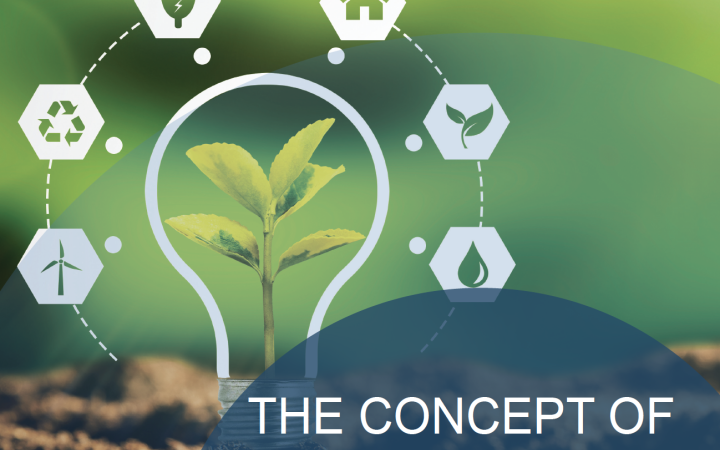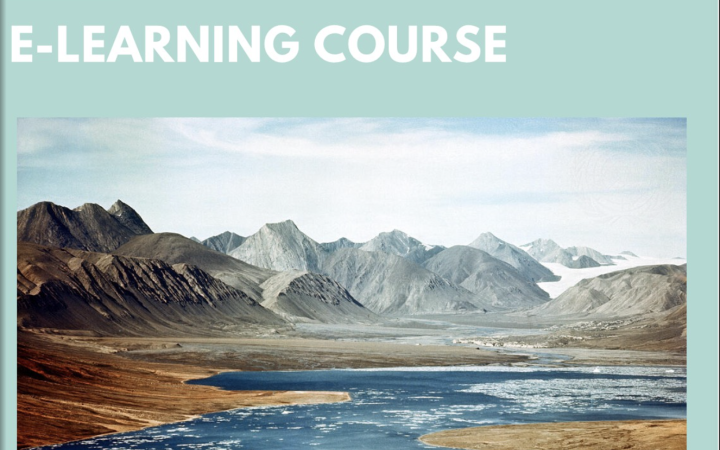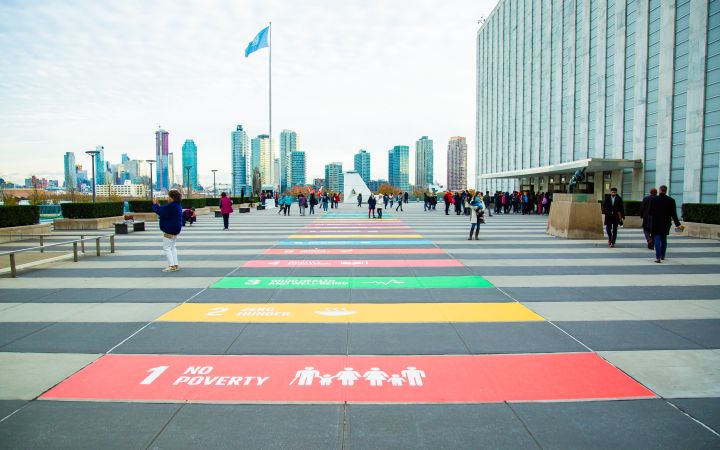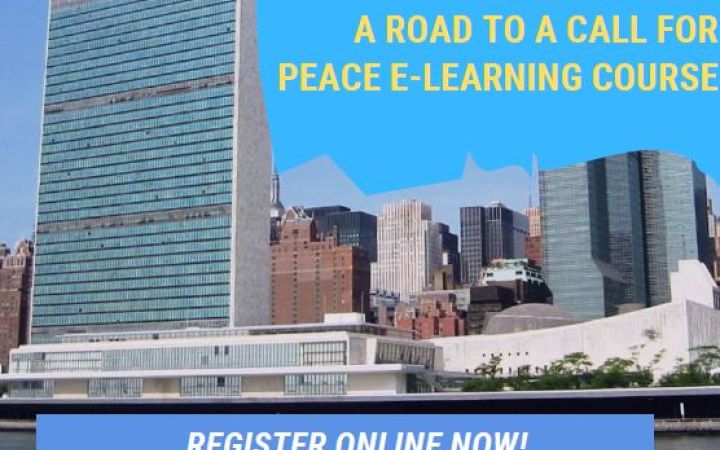E-LEARNING COURSES
These E-learning Courses are offered throughout the year and cover several topics including: ‘Achieving Peace, Preventive diplomacy, Multilateral Negotiation and Mediation: A Road to a Call for Peace E-Learning Course’ , ‘Business and the 2030 Agenda: Working Together Towards a Sustainable Future.’ and 'Harnessing Climate & SDGs Synergies: Raise Ambition in the Era of Paris+5 and Pandemic Recovery.'
- Business and the 2030 Agenda: Working Together Towards a Sustainable Future
- Achieving Peace, Preventative Diplomacy, Multilateral Negotiation, and Mediation: A Road to a Call for Peace
- Harnessing Climate & SDGs Synergies: Raise Ambition in the Era of Paris+5 and Pandemic Recovery
- The Concept of Sustainability
These courses would include case-study reviews, interactive videos, team collaborations, instructor-led exercises and diverse study resources which comprehensively cover issues related to the global ecosystem, gender rights; resource development; multilateralism, international politics; poverty eradication; water and sanitation; food security and nutrition; social, economic and environmental development. Participants would be granted a Certificate of Participation at the conclusion of the courses.
The Concept of Sustainability
This E-learning course demonstrates the importance of joining efforts, more necessary than ever, to integrate sustainability into our society. The proposal to continuously strive for a more sustainable world, and to bring social, environmental and economic dimensions together, offers a window of hope for generations to come. Many governments, businesses, civil society, academia and other actors are currently working to integrate sustainability into their agenda. But the challenges remain —- how to do it, which inspired the creation of this course.
In September 2015, the United Nations General Assembly approved the 2030 Agenda. This decision opened up a new way of working that appealed to new political decisions, and social changes. The lack of equality and justice in our society is not merely the government’s responsibility, but the responsibilities of the entire society. This is one of the most important messages in the 2030 Agenda. Thus, sustainability goes beyond the Agenda itself, and the scope of government’s work. It requires the involvement of all social actors. A sustainable future is only possible when the entire society is dedicated to building on the triple pillars (environmental, social and economic); and putting “human” back to the center of development.
The course is designed with sessions given by specialized speakers in different modules. The design of each session is unique - considering different topics, and various methodological formats. The genesis of the negotiation of the 2030 Agenda, or the challenges of access to water, or the ways to consolidate public & private partnerships, require very different approaches, analyses and ways of approaching the issues. These are the topics, discussions, and debates that you will find in this course - and we hope that the students could seek answers through a wide range of questions that we posted as instructors.
This design of the course aims to offer a global vision of what sustainability means, and its importance today. The final objective of the course is to provide a basic understanding of the meaning and the implications of sustainability. With this preliminary knowledge, more specific training actions will be carried out in the future with different actors in mind.
Duration: Self-paced
Course Objectives:
- Provide knowledge and training on sustainability criteria to evaluate each of the sustainability areas: economic, social and environmental.
- Concentrate studies in fields included in each of the sustainability areas
- Understand policies, strategies and models for sustainability in different settings (private sector companies, public institutions and civil society organizations).
- Build and develop skills and competencies to design and implement sustainability strategies.
Course Structure:
- Module 1: Introduction
- Module 2: Acknowledging inequalities
- Module 3: Protecting environmental resources
- Module 4: Gender equality
- Module 5: Peaceful and inclusive societies
- Module 6: Public and private partnerships
- Module 7: Actors for sustainability
- Module 8: Tools for achieving sustainability
To enroll for the course, please click the link and follow the steps: Paid Registration
Harnessing Climate & SDGs Synergies: Raise Ambition in the Era of Paris+5 and Pandemic Recovery
The world community faces major crises at the same time: The global COVID-19 public health crisis is worsening in many countries, causing loss of life, human suffering, and economic and social stress at levels not seen in decades. There is continued poverty in many countries across the world, with increasing socio-economic disparities. Despite the slow-down during the pandemic, recent reports on the continued rise in global greenhouse gas (GHG) emissions are alarming scientists and development policymakers. Without more ambitious action on climate, the world community may not be able to reach the main goals of the Paris Agreement of keeping climate change and global temperature increases in check.
As countries seek to address these interlinked challenges, harnessing climate and SDG synergies in recovery plans, in the updated NDCs, and in national efforts to advance the SDGs, present an unprecedented opportunity to raise climate ambitions, to leave no one behind, and to accelerate progress on the 2030 Agenda. It is in this context that UNDESA, UNFCCC, and UNITAR came together to develop an e-learning course to share the science, evidence, and tools that enable climate and SDG synergies. The course builds on the 2019 Climate and SDG Synergies Conference and the 2020-2021 Synergies Learning Series, going into more depth to provide policymakers with tools and evidence they may use to advocate for climate and synergies in related intergovernmental fora as well as their local context.
DURATION: Self Paced
Course Objectives
- Educate the public on the positive relations between pursuing climate goals and implementing SDGs.
- Introduce new sustainable business opportunities and possibilities for stakeholders by making the case for synergies.
- Introduce the tools used to identify and harness climate & SDG interlinkages, provide practical guidance on the industry level.
- Elaborate on the strategies to overcome implementation challenges. Eventually, the course aims to turn the pursuit of positive climate impact and the achievement of SDGs an industry and policy standards.
Course Structure
The course is a certificated program. It comprised with one introductory module and three main modules on the topics of climate and the SDGs. In the introductory module, students must indicate that they read through the syllabus and submit a short video/essay answering the listed questions.
- The Introductory Module
- Module 1 – The ‘Why’ question: Making the Case for Integrated Climate and SDGs Synergies
- Module 2 – The 'How' Question: Identifying Opportunities and Tradeoffs to Maximize Synergies
- Module 3 – The ‘What’ Question: What Barriers Need to be Overcome to Realize Synergies?
To register for the course and obtain directory manual for the course: Registration
To access the enrollment manual directly: Enrollment Manual
To access the course content pamphlet: Content pamphlet
BUSINESS AND THE 2030 AGENDA: WORKING TOGETHER TOWARDS A SUSTAINABLE FUTURE
This UNITAR training explores the possibilities for partnerships and developing a Community of Practice. It would focus on these primary themes:
- Examine how engagement with business is serving to meet the attainment of the SDGs – and the Addis Ababa Action Agenda (AAAA) – goal by goal, and how business can strive to “leave no one behind.”
- It will seek to highlight concrete examples and models of cooperation in UN private sector engagement.
- It will strive to present relevant considerations for ensuring accountability and monitoring progress.
DURATION: Self Paced
This course provides participants with an understanding of why the United Nations and the business community are vital to each other to obtain the Sustainable Development Goals (SDGs).
Key Objectives
- An appreciation of the multidimensional context within which leaders must exercise ethical leadership to achieve the SDGs;
- Equip participants with practical skills to enhance individual negotiation capacity;
- Deepen participants’ knowledge and understanding of the multiple connections between mechanisms of preventive diplomacy, multilateral negotiation, and the achievement of the Sustainable Development Goals.
Upon completion participants will have the opportunity to further engage with the subject matter; sustain longer-term outlet from which to engage with constituents; expand the learning scope; explore the possibilities for partnerships, and develop a Community of Practice.
Register for the course: Business and the 2030 Agenda: Working Together Towards a Sustainable Future
Achieving Peace, Preventive diplomacy, Multilateral Negotiation and Mediation: A Road to a Call for Peace E-Learning Course.
This course provides nuanced understandings on the international discourse, agendas, and the diverse environments that underlie the foundation for the multilateral negotiations on the United Nations level.
DURATION: Self Paced
Overview & Objectives
This course is primarily focused on Goal 16: Peace, justice and strong institutions, the revitalization of the preventive diplomacy discourse within the United Nations system.
The goal is to familiarize participants with would methods to ensure a joined-up analysis and system-wide adoption of preventive diplomacy, and the importance of inclusive peacemaking, with attention to gender parity in high-level working and advisory groups in peacekeeping operations and political missions. Important areas which would be covered are:
- the critical nature of cross-cutting approaches to conflict to resolve the root and structural causes, such as poverty, inequality and discrimination on the basis of gender, race and ethnicity, class, and religious affiliation, environmental degradation, and overall lack of sustainable infrastructure and access to basic resources;
- preventive diplomacy and multilateral negotiation can be framed as tools to advance cross-cutting targets for all SDGs;
- the relationship between peace and development is bidirectional; peace is critical for interdisciplinary sustainable development endeavors, and economic, social and environmental development must be guaranteed to achieve durable peace; and
- multilateral negotiation itself can be used as a governance mechanism by which governments and other stakeholders can skillfully navigate multilateral priorities and effectively coordinate action towards achieving the SDGs.
Register for the course: Achieving Peace, Preventive diplomacy, Multilateral Negotiation and Mediation: A Road to a Call for Peace E-Learning Course





